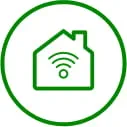In the age of rapid technological advancement, choosing the right internet connection is crucial for both businesses and households. While 5G has garnered significant attention for its high speeds and mobile capabilities, fiber internet remains the gold standard for delivering a superior digital experience. Here’s why fiber internet is not just faster, but also provides a better overall digital experience compared to 5G.

1. Consistent and reliable speeds
Fiber internet: Fiber-optic cables transmit data using light, allowing for incredibly fast and consistent speeds. This means you can enjoy symmetrical upload and download speeds, which are essential for activities like video conferencing, online gaming and large file transfers. Unlike traditional copper or coaxial cables, fiber optics are less susceptible to interference and signal degradation, ensuring a stable connection even during peak usage times.
5G: While 5G promises impressive speeds, its performance can vary widely depending on your location and network congestion. Factors like distance from the cell tower, physical obstructions and weather conditions can impact the reliability and consistency of your connection. This variability can lead to frustrating slowdowns, especially in densely populated areas.
Consider a mid-sized business that relies on cloud-based applications and video conferencing to communicate with remote teams. With fiber internet, this business can maintain smooth and uninterrupted operations even during peak hours. On the other hand, a 5G connection might struggle with consistency, leading to laggy video calls and delayed cloud access, ultimately affecting productivity.
2. Bandwidth for the whole household
Fiber Internet: With the growing number of connected devices in our homes, from smart TVs and laptops to IoT devices, having sufficient bandwidth is critical. Fiber internet can handle multiple high-bandwidth activities simultaneously without compromising performance. Whether you're streaming 4K videos, participating in virtual meetings or using smart home devices, fiber internet ensures everyone in the household enjoys a seamless experience.
5G: Although 5G offers high speeds, its bandwidth can be quickly consumed by multiple devices, leading to potential slowdowns. Additionally, 5G networks have a limited capacity compared to fiber, which can result in congestion during peak usage times, especially in areas with high device density.
In a typical household, one person might be streaming a movie in 4K, another might be playing an online game and someone else might be working from home on a video call. Fiber internet can effortlessly handle all these activities simultaneously. With 5G, the combined demand might lead to noticeable slowdowns.
3. Lower latency for real-time applications
Fiber Internet: Latency refers to the delay before data begins to transfer after a request is made. Fiber internet boasts extremely low latency, making it ideal for real-time applications such as online gaming, video conferencing and virtual reality. The instantaneous data transfer ensures a smooth and responsive experience, crucial for activities that require real-time interaction.
5G: While 5G has lower latency compared to previous mobile networks, it still can't match the ultra-low latency offered by fiber. This difference is noticeable in applications that demand real-time precision, where even the slightest of delays can impact on the user experience.
For online gamers and virtual reality enthusiasts, latency can make or break the experience. With fiber internet, gamers enjoy minimal lag, resulting in more accurate and enjoyable gameplay. VR applications, which require instantaneous responses to user movements, perform flawlessly with fiber. In contrast, the higher latency of 5G can result in delays that detract from the immersive experience.
4. Future-proof infrastructure
Fiber Internet: Fiber-optic technology is built to last and has the capacity to support future advancements in internet speeds and data demands. Investing in fiber infrastructure ensures that your internet connection will remain robust and capable of handling increasing data loads as technology evolves.
5G: Although 5G is a significant leap forward in mobile connectivity, it is still dependent on a network of cell towers and can be limited by physical and environmental factors. As data demands continue to grow, the infrastructure supporting 5G may need frequent upgrades to keep pace.
As more devices become connected and the demand for data grows, having a future-proof internet connection is essential. Fiber infrastructure can handle these increasing demands without significant upgrades, providing a long-term solution. In contrast, 5G may require ongoing investments in new cell towers and technology upgrades to maintain performance levels.
5. Enhanced security
Fiber Internet: The nature of fiber-optic cables makes them inherently secure. Data transmitted through fiber is difficult to intercept without physically cutting the cables, making it a safer option for sensitive information. This enhanced security is particularly important for businesses handling confidential data and for individuals concerned about privacy.
5G: While 5G networks incorporate advanced security protocols, the wireless nature of the connection makes it more susceptible to certain types of cyber threats. Ensuring the security of a 5G connection requires constant vigilance and up-to-date security measures.
For businesses that handle sensitive customer information or intellectual property, security is paramount. Fiber internet offers a level of protection that wireless technologies like 5G cannot match. This makes fiber the preferred choice for industries such as finance, healthcare and government, where data breaches can have severe consequences.
Conclusion
While 5G offers impressive speeds and the convenience of mobile connectivity, fiber internet stands out as the superior choice for a reliable, high-performance digital experience. Its consistent speeds, ample bandwidth, low latency, future-proof infrastructure and enhanced security make fiber internet the ideal solution for both businesses and households. If you're looking to maximize your digital experience and future-proof your connectivity, fiber internet is the way to go.






